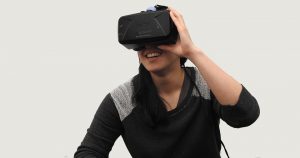 With the recent rise of augmented reality, it is only a matter of time before virtual reality becomes a regular part of daily life. It is already, for example, becoming common in behavioral health. Virtual reality is currently being utilized for treatment of several different phobias. This type of treatment is called VReality Therapy, and it is already making strides in helping people get over once-crippling fears.
With the recent rise of augmented reality, it is only a matter of time before virtual reality becomes a regular part of daily life. It is already, for example, becoming common in behavioral health. Virtual reality is currently being utilized for treatment of several different phobias. This type of treatment is called VReality Therapy, and it is already making strides in helping people get over once-crippling fears.
The premise of VReality Therapy is exposure. Clients put on virtual reality goggles that are manipulated by a trained therapist. They are slowly exposed to their phobias in the midst of performing relaxation techniques. Meanwhile, the therapist is also recording physiological responses of the patients so patients can keep a log of their progress. This is an ongoing therapy process, meaning that several sessions are necessary, however it has been proven to reduce fear of phobias, and even to remove it entirely.
Virtual reality is effective, as writes one patient who was treated for his phobia of blood with VReality Therapy. His phobia was a real issue due to the fact that he has diabetes, and therefore must take regular blood tests. His experience was with using a Samsung Gear VR Headset in the office of a trusted therapist. The program put him a virtual doctor’s office waiting room, then, after a while, into a virtual doctor’s office, where he was prepped by a nurse. His therapist talked him through relaxation techniques as his anxiety levels rose closer to the drawing of blood. When the blood was drawn in the virtual world, the author reports being able to feel it. The experience was jarring, but the author was able to get through ten minutes of having his blood virtually drawn, thanks to the guidance from his therapist.
A fear of blood is not the only thing being treated by these virtual reality goggles and therapists, however. There are also simulations to combat fears such as that of flying, heights, needles, animals, small spaces, driving, and public speaking. VReality Therapy can also be used as a resource to help treat generalized anxiety disorder. Patients can be eased into triggering situations in an environment they know is controlled by a trusted professional. This makes them more willing to work on facing their fears, and does not put them in harm’s way in the process.
Virtual reality has broad implications for for the world of behavioral health. Not only can it be used to treat things like phobias and anxiety, it may also be a great resource for those with depression and other mental illnesses. I cannot wait to see where VReality Therapy will lead!
For more information and behavioral health news, visit the New Horizon Counseling Center website.